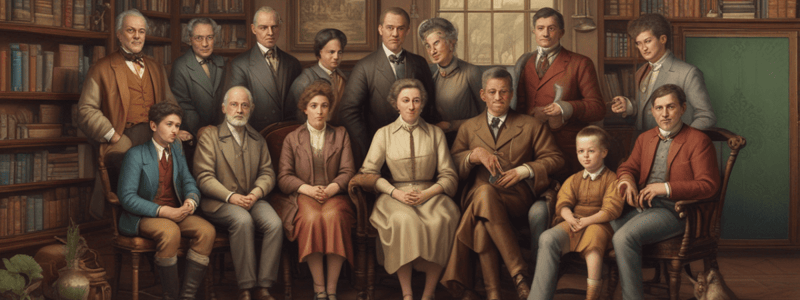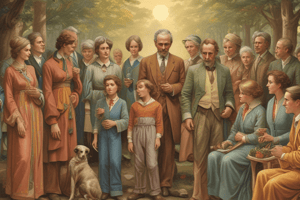Podcast
Questions and Answers
What was the main argument made by Parsons Finch (1989) regarding the pre-industrial family?
What was the main argument made by Parsons Finch (1989) regarding the pre-industrial family?
- Industrialization and urbanization first occurred in parts of Western Europe because pre-industrial family structures were already mainly nuclear rather than extended.
- Average life expectancy was low (around 35-40 years) in the pre-industrial period, reducing the number of vertically extended families.
- There was a wide range of household types in the pre-industrial period, with extended families being the norm.
- Family obligations were much stronger and family members provided greater support for each other compared to the industrial and post-industrial eras. (correct)
What did historical studies show about household types in the pre-industrial period?
What did historical studies show about household types in the pre-industrial period?
- Extended families were the norm in the pre-industrial period.
- There was a wide range of household types in the pre-industrial period, with no evidence that extended families were the norm. (correct)
- Industrialization and urbanization first occurred in parts of Western Europe because pre-industrial family structures were already mainly extended.
- Average life expectancy was low (around 35-40 years) in the pre-industrial period, leading to a dominance of extended families.
What is one alternative suggestion regarding the relationship between pre-industrial family structures and industrialization?
What is one alternative suggestion regarding the relationship between pre-industrial family structures and industrialization?
- Average life expectancy was low (around 35-40 years) in the pre-industrial period, leading to a dominance of extended families which hindered industrialization.
- The 'fit' between the nuclear family and the process of industrialisation was a key driver of industrialization in Western Europe.
- Industrialization and urbanization first occurred in parts of Western Europe because pre-industrial family structures were already mainly nuclear rather than extended.
- Pre-industrial family structures, without unbreakable ties to extended kin, were a contributing cause of industrial development. (correct)
What was one reason why extended families were not as common or dominant in the pre-industrial period as 'fit theorists' have suggested?
What was one reason why extended families were not as common or dominant in the pre-industrial period as 'fit theorists' have suggested?
According to the passage, what led some sociologists to question the idea of a 'fit' between the nuclear family and the process of industrialisation?
According to the passage, what led some sociologists to question the idea of a 'fit' between the nuclear family and the process of industrialisation?
What was the main implication of the finding that pre-industrial family structures were already mainly nuclear rather than extended in parts of Western Europe?
What was the main implication of the finding that pre-industrial family structures were already mainly nuclear rather than extended in parts of Western Europe?
Which of the following is the most likely reason why the inheritance system of primogeniture may have helped industrialization in the UK?
Which of the following is the most likely reason why the inheritance system of primogeniture may have helped industrialization in the UK?
According to the passage, what was a key consequence of urbanization during the industrialization process in the UK?
According to the passage, what was a key consequence of urbanization during the industrialization process in the UK?
Which of the following functions of the family was NOT mentioned in the passage as being taken over by other institutions during industrialization?
Which of the following functions of the family was NOT mentioned in the passage as being taken over by other institutions during industrialization?
Which of the following criticisms of the functionalist approach to the family is mentioned in the passage?
Which of the following criticisms of the functionalist approach to the family is mentioned in the passage?
According to the passage, which of the following was a key reason why working-class families relied on a strong kinship network during industrialization?
According to the passage, which of the following was a key reason why working-class families relied on a strong kinship network during industrialization?
The passage suggests that the nuclear family model encouraged by many governments is:
The passage suggests that the nuclear family model encouraged by many governments is:
What is the main reason the passage suggests that the nuclear family structure was able to provide support and stability during industrialization?
What is the main reason the passage suggests that the nuclear family structure was able to provide support and stability during industrialization?
According to the passage, which of the following functions of the family has been most modified rather than lost completely during industrialization?
According to the passage, which of the following functions of the family has been most modified rather than lost completely during industrialization?
Which of the following is NOT mentioned in the passage as a way in which the extended family structure helped working-class families during industrialization?
Which of the following is NOT mentioned in the passage as a way in which the extended family structure helped working-class families during industrialization?
Which of the following is the main reason the passage suggests that the functionalist approach to the family has been criticized?
Which of the following is the main reason the passage suggests that the functionalist approach to the family has been criticized?
According to Zaretsky, what role does the nuclear family play in society?
According to Zaretsky, what role does the nuclear family play in society?
How does Zaretsky suggest the family influences the perception of social problems?
How does Zaretsky suggest the family influences the perception of social problems?
What viewpoint does Zaretsky share with functionalists regarding the family?
What viewpoint does Zaretsky share with functionalists regarding the family?
How does Zaretsky describe the relationship between capitalism and families?
How does Zaretsky describe the relationship between capitalism and families?
What criticism does Zaretsky face regarding his perspective on the family?
What criticism does Zaretsky face regarding his perspective on the family?
How does Zaretsky's perspective on capitalism differ from functionalists' views on the economy?
How does Zaretsky's perspective on capitalism differ from functionalists' views on the economy?
What is a criticism of the functionalist approach to the family?
What is a criticism of the functionalist approach to the family?
Which aspect of the family's role does the functionalist approach downplay?
Which aspect of the family's role does the functionalist approach downplay?
How does the functionalist approach view socialization?
How does the functionalist approach view socialization?
According to Marxist views, how does the family benefit capitalism economically?
According to Marxist views, how does the family benefit capitalism economically?
In terms of ideological control, what role does Althusser attribute to the family?
In terms of ideological control, what role does Althusser attribute to the family?
Zaretsky's argument about socialization in families mainly emphasizes:
Zaretsky's argument about socialization in families mainly emphasizes:
What is a significant economic function that families perform for capitalism according to Marxist views?
What is a significant economic function that families perform for capitalism according to Marxist views?
'The family acts as a steady (stabilising) force that helps maintain the political order needed for companies to function profitably.' This statement aligns with which perspective on families?
'The family acts as a steady (stabilising) force that helps maintain the political order needed for companies to function profitably.' This statement aligns with which perspective on families?
'Socialisation involves the passing on of a ruling-class ideology.' This statement reflects which theoretical viewpoint on families?
'Socialisation involves the passing on of a ruling-class ideology.' This statement reflects which theoretical viewpoint on families?
How does Marxism differ from functionalism in terms of viewing the relationship between the family and economy?
How does Marxism differ from functionalism in terms of viewing the relationship between the family and economy?
Study Notes
Industrialisation in the UK
- The inheritance system of primogeniture in the UK contributed to industrialisation by concentrating wealth in fewer hands, allowing for investment in growing industries.
- Younger siblings moved to cities as factory workers, leading to the development of a broadly extended family structure.
Extended Family Structure
- The working class developed an extended family structure during industrialisation, mainly as a consequence of urbanisation.
- The extended family structure satisfied a number of purposes, including:
- Providing care and survival for working-class families in the absence of government support.
- Securing jobs for family members through kinship networks.
- Playing a vital role in childcare when both parents worked.
- Adding to family income through child labour.
Changes in Family Functions
- Some functions once performed by families have been taken over by other institutions, including:
- Education (handled by a school system).
- Health and social care (handled by professionals).
- Recreation and leisure (become more individualised or outside the home).
- However, these functions have been modified rather than lost completely, with families still playing an important role in:
- Education (many parents are actively involved in their children's education).
- Care (families still play a vital role in caring for the sick and elderly).
- Leisure and recreation (many families share leisure activities, although this may be largely consumed outside the home).
Functionalism and the Family
- Functionalists were the first sociologists to focus on the importance of family life and recognise the commonality of the two-generation nuclear family worldwide.
- Functionalists drew attention to the positive ways in which families provide support for individuals and help stabilise society.
- However, functionalist accounts of the family have been criticised for:
- Being out of date and not applicable to all societies.
- Ignoring differences of social class and ethnicity.
- Focusing on the functions of the family and neglecting negative aspects.
- Idealising the nuclear family and ignoring the viability of other types of family.
Criticisms of Parsons' Functionalism
- Finch (1989) arguing that there was little evidence to support the idea that family obligations were stronger before the Industrial Revolution.
- Historical studies showing that there was a wide range of household types in the pre-industrial period, with no evidence that extended families were the norm.
- Alternative suggestions that industrialisation and urbanisation occurred in parts of Western Europe because pre-industrial family structures were already mainly nuclear rather than extended.
Marxism and the Family
- Zaretsky argued that the growth of the privatised nuclear family encourages family members to focus on private problems rather than wider social concerns.
- The family becomes a release for adult frustrations, with men exerting power over their families to compensate for their powerlessness in the workplace.
- Marxism sees the family as playing an important part in legitimising class inequalities and as a target for companies seeking to maximise profits.
- However, Marxism may also be exaggerating the negative aspects of the family, neglecting the real social and emotional fulfilment many people get from family life.
Studying That Suits You
Use AI to generate personalized quizzes and flashcards to suit your learning preferences.
Description
Explore the arguments against Parsons Finch's idea about family obligations and support in pre-industrial times. Learn about the lack of evidence supporting the notion of stronger family ties before the Industrial Revolution, as well as the diverse household structures in that era.




